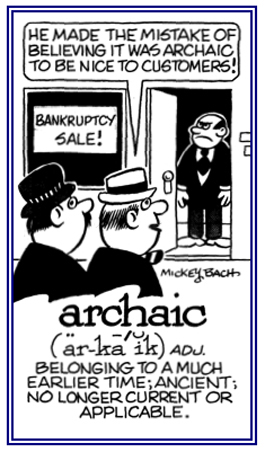archaeo-, archeo-, archae-, arche-, archa-, archi-, -arch
(Greek: original [first in time], beginning, first cause, origin, ancient, primitive, from the beginning; most basic)
Archaeozoologists analyze the animal remains from different parts of a site in order to understand some of the internal organizations of the settlements, while comparisons between sites within a region may show how different or similar the areas were.
2. In a linguistic form, commonly used in an earlier time but rare in present-day usage except to suggest the older time, as in religious rituals or historical novels: Examples of archaic language usages include the following: "thou", "wast", "methinks", and "forsooth".
3. Depicting the earliest stage; prior to full development: There was an archaic period of psychoanalytic research.
The company had to update its archaic computers because they were incapable of handling all of the data that was being installed into them.
4. A reference to or designating the style of the fine arts: There are some archaic paintings and sculptures that were developed in Greece from the middle of the 7th to the early 5th century B.C., primarily characterized by an increased emphasis on the human figure in action with naturalistic proportions and anatomical structures. There are also simplicity of volumes, forms, or designs, and the evolution of a definitive style for the narrative treatment of subject matters.5. A term used to describe an early stage in the development of civilization: In New World chronology, an archaic period existed just before the shift from hunting, gathering, and fishing to agricultural cultivation, pottery development, and village settlement.
Between 8000-1000 B.C., there were a series of archaic achievements which characterized certain periods: Early archaic 8000-5000 B.C., mixture of big-game hunting tradition with early archaic cultures; also marked by post-glacial climatic change in association with the disappearance of Late Pleistocene big game animals. The middle archaic cultures were from 5000-2000 B.C., and a late archaic period from 2000-1000 B.C.

Go to this Word A Day Revisited Index
so you can see more of Mickey Bach's cartoons.
The archaic maiolica were sold as far away as Spain, North Africa, and northern Europe. There seems to be a connection to earlier Byzantine and Persian products.
Examples of archaisms are "thou", "methinks", "museums", "hark", "hither", "howbeit", and "doth".
2. A person who utilizes old-fashioned terms and expressions in language: Susan was an archaist who somehow had an affinity towards interesting and outdated words and used them everyday when talking to her family and friends!
2. In ornithology, pertaining to the simple kind of intestine: Jane wondered if birds still had archecentric body parts, or if such parts developed over time.
Related "time" units: aevum, evum; Calendars; chrono-; horo-; pre-; Quotes: Time; tempo-.


